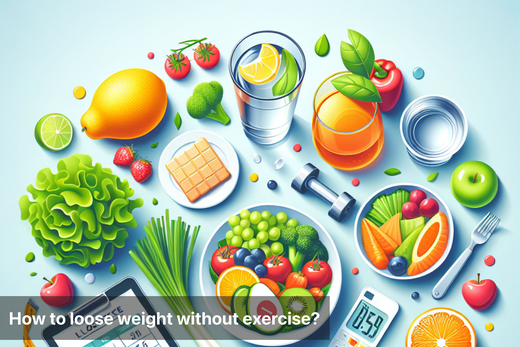
How to lose weight without exercise?
Share
Weight loss is a common concern for many individuals. While exercise is widely regarded as an effective method for weight loss, it is not the only route available. In this blog, we will explore various approaches that allow you to shed pounds without engaging in physical activity.
You'll discover that creating a caloric deficit—consuming fewer calories than you burn—plays a significant role in weight reduction. Additionally, we'll discuss how your metabolism influences the weight loss process and why tweaking your dietary habits can be just as impactful.
From making conscious dietary adjustments to implementing lifestyle changes that promote overall well-being, there are effective ways to achieve your weight goals without sweating it out in the gym.
Understanding Importance of Diet Weight Loss
Diet plays an important role in weight loss journey. Here are the reasons why a good diet in important:
Major Contributor: Diet plays a more significant role in weight loss compared to exercise.
Calorie Control: Managing calorie intake is essential to create a calorie deficit.
Nutrient Quality: Focus on nutrient-dense foods to support overall health.
Sustainable Changes: Healthy eating habits ensure long-term weight management.
Key Tips for Losing Weight Without Exercise
1. Focus on Calorie-Dense, Nutrient-Rich Foods
Foods that are high in nutrients but low in calories help you feel full without overeating.
Food Group |
Examples |
Benefits |
|---|---|---|
Vegetables |
Spinach, broccoli, zucchini |
Low calorie, high fiber |
Lean Proteins |
Chicken breast, tofu, fish |
Promotes satiety and muscle repair |
Whole Grains |
Quinoa, brown rice, oats |
Sustained energy, high in fiber |
Healthy Fats |
Avocado, nuts, olive oil |
Keeps you full, supports hormones |
2. Control Portion Sizes
Using smaller plates, measuring servings, and avoiding second helpings can significantly reduce calorie intake.
3. Eat More Fiber
Fiber slows digestion and keeps you full for longer. Incorporate high-fiber foods like lentils, beans, chia seeds, and fruits.
4. Stay Hydrated
Drinking water before meals can reduce appetite and prevent overeating. Replace sugary drinks with water, herbal teas, or infused water.
5. Avoid Processed and Sugary Foods
Minimize consumption of packaged snacks, sugary beverages, and desserts. These foods are high in empty calories and can hinder weight loss.
“Weight loss begins in the kitchen. Small changes in what you eat can lead to big changes in how you feel and look.” adds Health Coach Madhavi Mahajan (PG in Sports Science, Fitness & Nutrition)
Sample Nutrition Table for a Weight Loss Diet
Here is a general breakdown of a day’s nutritional intake to support weight loss without exercise:
Nutrient |
Recommended Amount per Day |
Example Foods |
|---|---|---|
Calories |
1200-1500 kcal |
Balanced meals |
Protein |
50-70 g |
Eggs, chicken, legumes |
Carbohydrates |
100-150 g |
Quinoa, brown rice, sweet potato |
Fiber |
25-30 g |
Fruits, vegetables, whole grains |
Healthy Fats |
20-35 g |
Avocado, olive oil, nuts |
Lifestyle Modifications for Weight Loss
1. Prioritize Sleep
Poor sleep disrupts hunger hormones, leading to increased cravings. Aim for 7-9 hours of quality sleep each night.
2. Manage Stress
Chronic stress can trigger overeating. Practice relaxation techniques such as deep breathing, meditation, or yoga.
3. Practice Mindful Eating
Avoid distractions during meals, chew slowly, and savor each bite. This helps prevent overeating and enhances digestion.
4. Use Smaller Plates
Psychologically, smaller plates make portions appear larger, helping you feel satisfied with less food.
5. Plan Your Meals
Meal planning prevents impulsive eating and ensures you stick to your calorie goals.
Summary
In conclusion, it is indeed possible to lose weight without exercise by making conscious dietary choices and embracing certain lifestyle modifications. Throughout this discussion, we examined the fundamental concept of caloric deficit, which is crucial for weight loss. By lowering calorie intake through strategic dietary changes, such as controlling portion sizes and opting for whole foods, you can create the necessary deficit to shed pounds effectively.
We also explored lifestyle factors that significantly influence weight management. Quality sleep, stress management, and proper hydration play vital roles in supporting your weight loss journey. Improving these areas can enhance your metabolism and reduce unhealthy cravings, making it easier to stick to your dietary plans.
So, if you've been asking yourself, “Can I lose weight without exercise?” the answer is yes. By prioritizing your nutrition and adopting healthy lifestyle habits, you can achieve your weight loss goals without the need for rigorous physical activity. Taking these steps not only leads to weight loss but also contributes to overall well-being.
FAQs
1. Is it possible to lose weight without any exercise?
Yes, weight loss is achievable by creating a calorie deficit through diet alone. However, incorporating even light physical activity can enhance results and improve overall health.
2. How do I deal with hunger while on a calorie deficit?
Focus on high-fiber and protein-rich foods, as they promote satiety. Drinking water and eating smaller, more frequent meals can also help.
3. Can I indulge in cheat meals?
Occasional indulgences are fine, but keep them moderate. Balance them with healthier choices in subsequent meals.
4. How long does it take to see results?
Weight loss varies by individual, but you can typically notice changes within 2-4 weeks with consistent efforts.
5. Are weight-loss supplements effective?
While some supplements may help, they are not a substitute for a healthy diet. Always consult a healthcare professional before using any supplements.


